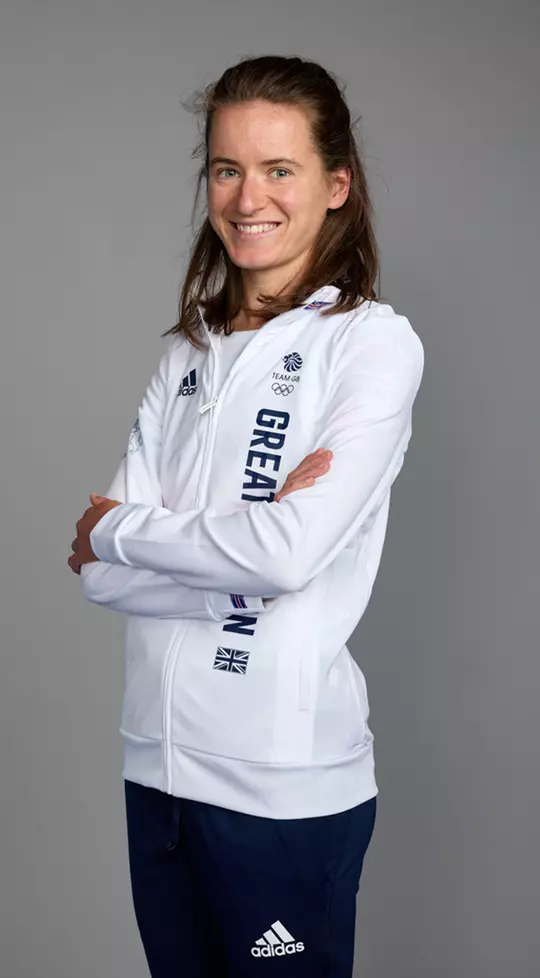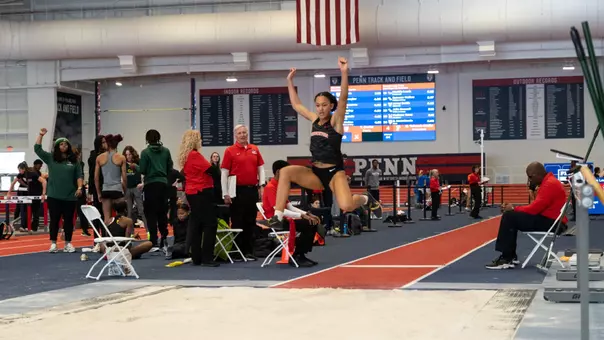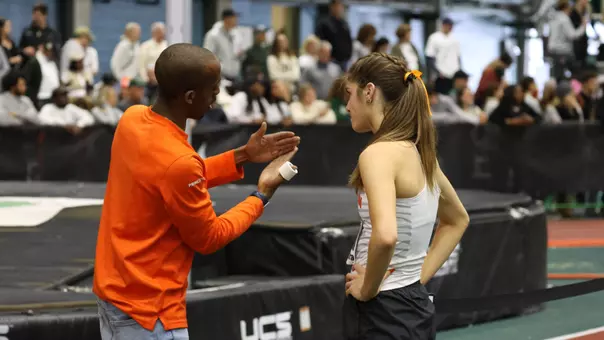Princeton University Athletics
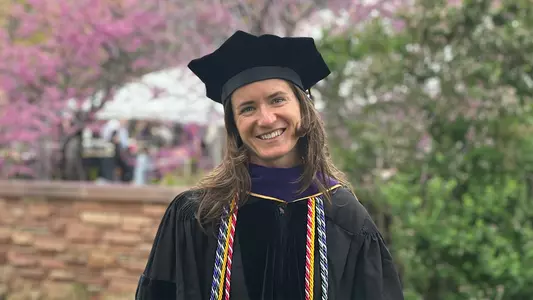
Princeton In Paris Feature: Lizzie Bird
July 16, 2024 | Women's Cross Country, Women's Track and Field
Lizzie Bird is now a few weeks away from running the steeplechase for Great Britain in the Olympic Games for the second time, after reaching the final and finishing ninth in Tokyo three years ago. No British woman has ever run the event faster than she has.
The bird, or, more accurately, this Bird, capital “B,” took flight years ago, her figurative wings having transported her to all corners of the globe. For all of her worldly travels, she remains indigenous to a spot a little north of London.
Lizzie Bird, Princeton Class of 2017, gives that away when her “er” turns to “uh,” especially as she says the word “sistuh," which she does as she discusses the intricacies of the 3,000-meter steeplechase.
“My niece Eden is 3,” Bird says. “She came to watch me race, and then after that she watched the 1,500. She asked her mother why they weren’t going into the water also. My sistuh said ‘well, no, what Lizzie does is weird.’”
Lizzie Bird is now a few weeks away from running the steeplechase for Great Britain in the Olympic Games for the second time, after reaching the final and finishing ninth in Tokyo three years ago. No British woman has ever run the event faster than she has.
When she came to Princeton, she was recruited to be a solid middle distance runner, someone who could probably score points at the Ivy League Heptagonal championships. She was not considered to be an Olympic prospect.
How she got there is fascinating. It’s also just a tiny part of the story of this Bird, one of the most impressive young Princeton alums you’d ever hope to meet. She’s a lawyer — and needed only 2.5 years to become one. She’s an authority on the subject of immigration. She’s lived all over the world. And all of that is in addition to being an Olympian, er, a two-time Olympian.
You can use a lot of words to describe her before you ever get to “weird.”
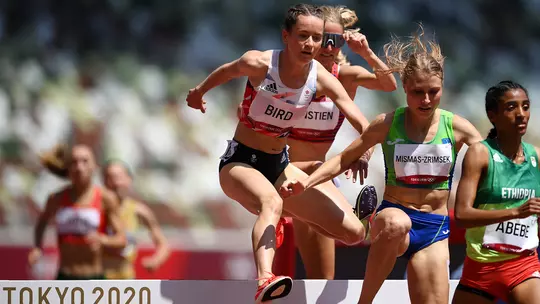
If you ask Peter Farrell a question, he’ll give you an answer — eventually. He never takes the direct route to get there, and the trip he takes along the way is usually fascinating.
Farrell spent 39 years as the head coach of women’s track and field at Princeton. It was he who recruited Bird out of St. Albans School in England in 2013, and it was he who introduced her to the steeplechase.
So when you ask him about Bird and why he thought she might be good at the event, or what he saw of her potential beyond Princeton, or what it takes to be a successful steeplechaser, it’s not surprising that the first person he mentions is not Lizzie Bird. It’s not even someone who ran track, or, for that matter, someone who has even been alive in the last 200 years.
“The HMS Victory was Lord Nelson’s flagship at Trafalgar,” Farrell starts. “At Trafalgar, Nelson had the Spanish and French fleets in front of him. The British were going to come in perpendicular.”
He then goes on to give a few details of the Battle of Trafalgar, fought on Oct. 21, 1805. The British fleet won the day, though at the cost of Lord Nelson’s life.
Fascinating? Yes. What in the world does this have to do with Lizzie Bird and the steeplechase?
“Before the battle,” Farrell says, “Lord Nelson’s second said they were waiting for his message. He told them ‘England expects each to do his duty.’ I used to tell her that before big races.”
See? He got there.
“To use a Naval term, she is squared away,” he says. “She’s got it together. She’s calm. She’s confident. She’s not boisterous. She’s a Brit, right?”
Yes, she is. She even has an “England Expects” hat, courtesy of her college coach. She is a Brit — and much more.
Lizzie Bird is a Brit who was born in the Phillipines. The daughter of a geologist in the oil and gas business, she lived there and in places like Pakistan and Dubai before she ever came to St. Albans in England, let alone Princeton.
“We had really nice hikes in Pakistan,” she says. “My sistuh and I would ride on horses. The mountains were just beautiful. Dubai was totally different than that. It was so built up. Maybe not as much as today, but it was still really built up. I really liked my school there. It was an international school.”
It was in Dubai where she first began to run. She was around 10 at the time, and she ran in a weekly race in a local park. Was the winner the person who ran the fastest? No. The way it worked was that each runner had to write down an estimated time for the race, and whoever came closest to his or her own predicted time was the winner.
When she went back to England, she played sports like field hockey, tennis and netball — “I could run fast, but I wasn’t very coordinated” — before sticking to track and field. With all of her time spent to the east of England, her first trip over the Atlantic came when she was looking at colleges in the United States and the chance to run competitively. In all she went to visit eight different schools and had to cut her visit short to the final one, Princeton, because Hurricane Sandy was about to strike. She chose to be a Tiger anyway.
“She was certainly recruitable,” Farrell says. “Did I think she’d be a world-beater? No. Her time was very good though. Plus she was a St. Albans kid. They are well-prepared to do well at Princeton. She fit in easily.”
She would win two Ivy League steeplechase championships and one Ivy League cross country title, and she was an honorable mention All-American in the steeplechase her sophomore year. She scored points at Heps in the 3,000 as well.
That’s a solid career. There was nothing about her that screamed “future Olympian” though.
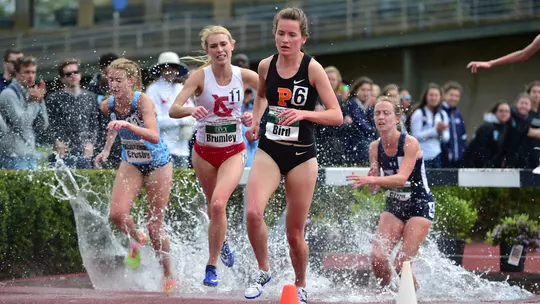
The 3,000-meter steeplechase is the most unique event in track and field. As you recall, Bird’s niece Eden called it “weird.” Perhaps on some level, the three year old is correct.
Each race is seven laps around the track, and each lap includes four hurdles and a water jump. Doing the math, that’s 28 hurdles and seven times over the water jump. It’s actually a little more than seven full laps, since the first lap starts a few meters back and doesn’t include any additional hurdles.
“I’ve coached the steeple with a lot of runners,” Farrell says. “Some just never get it. There’s a different challenge to it. Lizzie said she wanted to try it, so I set it up.”
The hardest part is the water jump. The proper technique is to have your right leg on the crossbar of the barrier and then have your left leg go as far as possible into the water, which stretches 12 feet until it evens out back onto the track.
“Your next step has to be on land,” Farrell says. “At first, they usually hit the barrier, or fall in the water or land on both feet in the water. Lizzie did it like she was doing it her whole life. She just had a natural take to it. You can spend an awful lot of time getting people to learn to get over the barriers. She was a natural."
“As soon as I tried it, I knew it was so much more fun than just running around in circles,” Bird says. “It’s not just a lot of laps. The barriers and water jump break up the race. You’re constantly changing your pace on your runs. Fast. Slow. Medium. Fast. Medium. It’s mentally so hard just to run laps and laps.”
Bird ran as a grad student at the University of San Francisco while earning a master’s degree. After that, she had reached a bit of a crossroads — dedicate herself to improving and seeing if she could make an international splash or step away and go to law school.
“I didn’t want that to be how my running career ended,” she says. “That’s why I decided to keep going.”
First, she got herself into peak health and condition. Then she began to work with an actual steeplechase coach, Pat McCurry, who told her she had potential to become a qualifier for the 2019 World Championships in Doha, which she did.
“It was so hot there,” she says. “Even the water jump didn’t cool you off. It was like bath water.”
The next logical step was to be the 2020 Olympic Games in Tokyo, which were pushed back a year due to the pandemic. Even in 2021, there were still limits on spectators, the Olympic Village and everything.
“It felt like the Olympics,” she says. “Japan did a great job of making us feel so welcome, even in the middle of the pandemic. The volunteers were so kind and friendly. Competing on the track certainly felt like an Olympic experience. It was only my second major championship, and I hadn’t experienced a full stadium to that point anyway.”
There was something else she hadn’t experienced to that point either — the final of major steeplechase event. Not at the World Championships. Not even at the NCAA championships.
There were three opening round heats in a stadium with a handful of spectators, tens of thousands of cardboard cutouts and pumped in crowd noise. The top three finishers in each heat advanced directly to the final, where those nine would be joined by the runners with the next six fastest times. Bird was in Heat 3, where the top five runners were separated by little more than a second and where the fifth runner, Bird, ended up running the fifth-best time among non-automatic qualifiers. Her time was more than five full seconds ahead of the seventh.
“My goal was to make the final,” she says. “I had never made a final before. I had just missed out in Doha. At the NCAAs I fell and finished last. When I finished my heat in Tokyo, I thought ‘I need a new goal.’ That became finishing in the Top 10.”
By the final lap it was pretty obvious that she was going to achieved that goal. In the end, she actually pushed through into ninth place, nipping Ethopian Zerfe Wondemagegn at the tape.
“That was a dream,” Bird says. “I remember feeling a little bittersweet though. I was so happy how it had gone, and I was ready to start law school and get on with a professional career. But then, I also thought I could keep training for my first year and see how it goes.”
She began law school at the University of Colorado a few weeks after the Tokyo Games ended. She would run early in the morning or after class in the altitude of Boulder, alternating between running trails and high school tracks.
“I think the first year was a similar workload to Princeton,” she says. “Princeton had prepared me so well for it. There was a lot of reading, and you learn to do it. After a few semesters, you get into the rhythm of reading, class, exams.”
Her next major international event after the Olympics would also be her first experience in running in a full stadium. The occasion was the 2022 Commonwealth Games in Birmingham, where she’d finish second in the steeplechase.
“It was after my first year,” she says, “that I started to think it would be nice to book-end law school with another Olympics.”
She actually sped up her classes, graduating in 2.5 years and then passing the Colorado bar exam this past February. She interned at the UCLA Center For Immigration Law and Policy last summer, and she’ll be clerking in Nevada starting after these upcoming Games.
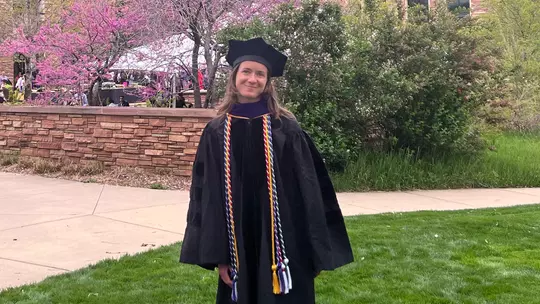
As for Paris, her road there was a lot rougher than she might have expected when she dedicated herself to another Olympic cycle. This time, it was mono that derailed her for pretty much all of last summer, limiting her to one race that was, in her words, “awful.”
This was a bigger problem than it might seem. Yes, it was way better than having it happen this year, but runners need to meet the Olympic qualifying standard within 12 months of the Games to qualify. Bird missed out on an entire season of trying to do so.
In the steeplechase, that qualifying mark this year is 9:23. Could she do it? No problem. Bird ran a 9:18.4 at the European Championships in Rome in June, and she followed that up by winning the event at the U.K. Championships. The two performances clinched a second trip to the Olympics.
“The first time, it’s impossible to describe,” she says. “This time, you know you can do it, but it’s still exciting.”
The first round of the women's steeplechase in Paris will be Aug. 4. Because track and field starts so late, the British team will be training in St. Moritz and will miss the Opening Ceremonies.
For someone who has been everywhere, she has spent little time in Paris. She has taken the Eurostar train, the one that goes under the English Channel, and she did run a 5K for fun there.
This time, it'll be for much higher stakes. Lizzie Bird has earned her Olympic bookend — and there's nothing weird about that.
— by Jerry Price
